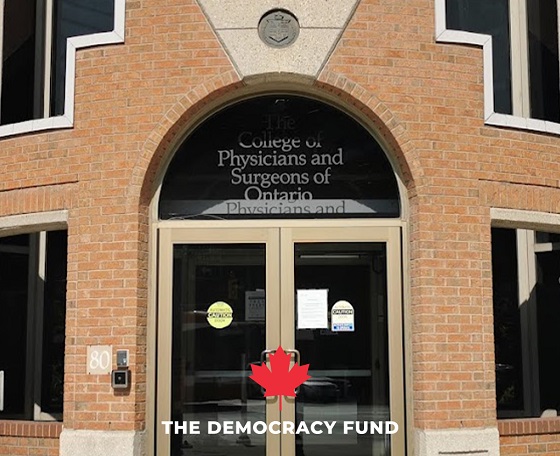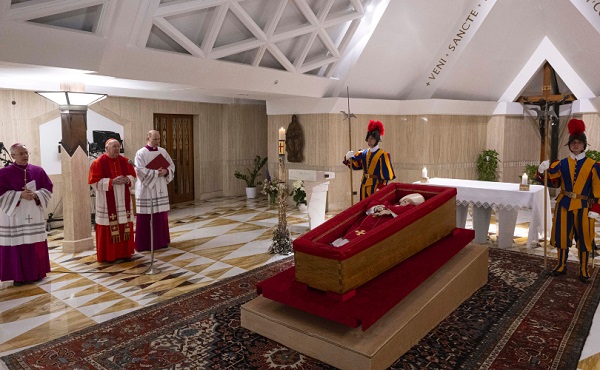COVID-19
Ontario doctor has allegations of misconduct over his COVID-19 social media posts withdrawn by the CPSO

News release from The Democracy Fund
The Democracy Fund (TDF) announces that the College of Physicians and Surgeons of Ontario (CPSO) today formally withdrew charges against Dr. Jean Marc Benoit, which alleged that his posts on X (formerly Twitter) during the COVID-19 pandemic were “disgraceful, dishonourable or unprofessional.”
Dr. Benoit is a family and emergency physician who works in various clinical and hospital settings. During his career, he has assumed leadership roles, including appointments as Acting Chief of Staff and President of the Medical Staff Association at the Brantford General Hospital. Dr. Benoit also has academic and research interests and has been published in peer-reviewed medical literature.
During the early days of the declared pandemic, Dr. Benoit followed the latest data and stayed on top of COVID-19 developments. He was proactive in engaging with officials, from the hospital level through to government, asking them to employ best practices in pandemic management.
He later moved his commentary to X, primarily posting about inadequate data, lockdown harms, conflicts of interest, treatment alternatives, and VAERS data (vaccine injuries). Ultimately, his posts became critical of the public health response and its adverse impacts on patients and the general public. This was contrary to a statement issued by the CPSO to all physicians, which cautioned them to align their opinions with governments’ public health policies. In its Notice of Hearing, sending his case to the disciplinary tribunal, the CPSO accused Dr. Benoit of making “misleading, incorrect or inflammatory statements about vaccinations, treatments and public health measures for COVID-19.”
Dr. Benoit places a high value on individual rights and on the sanctity of life, as well as scientific accuracy, and was deeply troubled by how quickly our society became swept up in the belief that everyone had to receive the COVID-19 vaccine, regardless of their personal risk profile, whether they had natural immunity, and the fact that the shots did not stop the transmission of infection. Physicians like Dr. Benoit, who publicly questioned vaccine mandates or lockdowns, were often subject to public complaints and investigations by their regulators.
Indeed, Dr. Benoit had an unblemished discipline record before he came to the CPSO’s attention in the spring of 2021, following complaints by two other physicians (whose names were not disclosed to him), prompting an investigation.
The matter had been scheduled for a 5-day hearing, but instead concluded with a short appearance today, as Dr. Benoit pleaded “no contest” to failing to respond to a College communication, receiving a reprimand, and the CPSO formally withdrew the balance of the allegations. Dr. Benoit was represented by lawyer Lisa Bildy of Libertas Law, with the support of TDF.
“While many physicians had concerns about novel and potentially harmful public health measures, few were willing to risk the severe financial and professional consequences of speaking up, which led to an illusion of consensus,” said Bildy. “Some, like Dr. Benoit and Dr. Gill, continued their public advocacy in spite of the risk. Thanks to TDF, they were able to present an appropriate defence of their positions with their regulator, which resulted in the withdrawal of some or all of the allegations against them.”
As Dr. Benoit stated, “I respect that the CPSO must respond to concerns about physicians’ behaviour, especially in a clinical setting. During COVID, they went further by curtailing criticism of public health measures, perhaps to contain panic. This approach may have had unintended effects on public trust. I hope that the College finds a smoother approach in the future—one that also respects individual physicians’ rights and responsibilities to advocate for the health of patients and fellow citizens, particularly under emergency situations where the facts and implications are not fully known and should not be assumed.”
To help in the fight for physicians to freely express concerns and openly debate the science on public health policies, you can make a tax-deductible donation on this page to support TDF.
For media interviews, please contact:
Lisa Bildy, Libertas Law
Email: [email protected]
About The Democracy Fund:
Founded in 2021, The Democracy Fund (TDF) is a Canadian charity dedicated to constitutional rights, advancing education and relieving poverty. TDF promotes constitutional rights through litigation and public education. TDF supports an access to justice initiative for Canadians whose civil liberties have been infringed by government lockdowns and other public policy
2025 Federal Election
Conservatives promise to ban firing of Canadian federal workers based on COVID jab status

From LifeSiteNews
The Conservative platform also vows that the party will oppose mandatory digital ID systems and a central bank digital currency if elected.
Pierre Poilievre’s Conservative Party’s 2025 election platform includes a promise to “ban” the firing of any federal worker based “solely” on whether or not they chose to get the COVID shots.
On page 23 of the “Canada First – For A Change” plan, which was released on Tuesday, the promise to protect un-jabbed federal workers is mentioned under “Protect Personal Autonomy, Privacy, and Data Security.”
It promises that a Conservative government will “Ban the dismissal of federal workers based solely on COVID vaccine status.”
The Conservative Party also promises to “Oppose any move toward mandatory digital ID systems” as well as “Prohibit the Bank of Canada from developing or implementing a central bank digital currency.”
In October 2021, the Liberal government of former Prime Minister Justin Trudeau announced unprecedented COVID-19 jab mandates for all federal workers and those in the transportation sector. The government also announced that the unjabbed would no longer be able to travel by air, boat, or train, both domestically and internationally.
This policy resulted in thousands losing their jobs or being placed on leave for non-compliance. It also trapped “unvaccinated” Canadians in the country.
COVID jab mandates, which also came from provincial governments with the support of the federal government, split Canadian society. The shots have been linked to a multitude of negative and often severe side effects, such as death, including in children.
Many recent rulings have gone in favor of those who chose not to get the shots and were fired as a result, such as an arbitrator ruling that one of the nation’s leading hospitals in Ontario must compensate 82 healthcare workers terminated after refusing to get the jabs.
Beyond health concerns, many Canadians, especially Catholics, opposed the injections on moral grounds because of their link to fetal cell lines derived from the tissue of aborted babies.
COVID-19
RFK Jr. Launches Long-Awaited Offensive Against COVID-19 mRNA Shots

 Nicolas Hulscher, MPH
Nicolas Hulscher, MPH
As millions of Americans anxiously await action from the new HHS leadership against the COVID-19 mRNA injections—injected into over 9 million children this year—Robert F. Kennedy Jr. has finally gone publicly on the offensive:
Let’s go over each key point made by RFK Jr.:
The recommendation for children was always dubious. It was dubious because kids had almost no risk for COVID-19. Certain kids that had very profound morbidities may have a slight risk. Most kids don’t.
In the largest review to date on myocarditis following SARS-CoV-2 infection vs. COVID-19 vaccination, Mead et al found that vaccine-induced myocarditis is not only significantly more common but also more severe—particularly in children and young males. Our findings make clear that the risks of the shots overwhelmingly outweigh any theoretical benefit:
The OpenSAFELY study included more than 1 million adolescents and children and found that myocarditis was documented ONLY in COVID-19 vaccinated groups and NOT after COVID-19 infection. There were NO COVID-19-related deaths in any group. A&E attendance and unplanned hospitalization were higher after first vaccination compared to unvaccinated groups:
So why are we giving this to tens of millions of kids when the vaccine itself does have profound risk? We’ve seen huge associations of myocarditis and pericarditis with strokes, with other injuries, with neurological injuries.
The two largest COVID-19 vaccine safety studies ever conducted, involving 99 million (Faksova et al) and 85 million people (Raheleh et al), confirm RFK Jr.’s concerns, documenting significantly increased risks of serious adverse events following vaccination, including:
- Myocarditis (+510% after second dose)
- Acute Disseminated Encephalomyelitis (+278% after first dose)
- Cerebral Venous Sinus Thrombosis (+223% after first dose)
- Guillain-Barré Syndrome (+149% after first dose)
- Heart Attack (+286% after second dose)
- Stroke (+240% after first dose)
- Coronary Artery Disease (+244% after second dose)
- Cardiac Arrhythmia (+199% after first dose)
And this was clear even in the clinical data that came out of Pfizer. There were actually more deaths. There were about 23% more deaths in the vaccine group than the placebo group. We need to ask questions and we need to consult with parents.
Actually, according to the Pfizer’s clinical trial data, there were 43% more deaths in the vaccine group compared to the placebo group when post-unblinding deaths are included:
We need to give people informed consent, and we shouldn’t be making recommendations that are not good for the population.
Public acknowledgment of the grave harms of COVID-19 vaccines signals that real action is right around the corner. However, we must hope that action is taken for ALL age groups, as no one is spared from their life-reducing effects:
Alessandria et al (n=290,727, age > 10 years): People vaccinated with 2 doses lost 37% of life expectancy compared to the unvaccinated population during follow-up.
Epidemiologist and Foundation Administrator, McCullough Foundation
Please consider following both the McCullough Foundation and my personal account on X (formerly Twitter) for further content.
-

 2025 Federal Election2 days ago
2025 Federal Election2 days agoBREAKING: THE FEDERAL BRIEF THAT SHOULD SINK CARNEY
-

 John Stossel2 days ago
John Stossel2 days agoClimate Change Myths Part 2: Wildfires, Drought, Rising Sea Level, and Coral Reefs
-

 Media2 days ago
Media2 days agoCBC retracts false claims about residential schools after accusing Rebel News of ‘misinformation’
-

 2025 Federal Election2 days ago
2025 Federal Election2 days agoCHINESE ELECTION THREAT WARNING: Conservative Candidate Joe Tay Paused Public Campaign
-

 Business2 days ago
Business2 days ago‘Great Reset’ champion Klaus Schwab resigns from WEF
-

 Bjorn Lomborg2 days ago
Bjorn Lomborg2 days agoNet zero’s cost-benefit ratio is CRAZY high
-

 International2 days ago
International2 days agoPope Francis’ funeral to take place Saturday
-

 Business21 hours ago
Business21 hours agoTrump: China’s tariffs to “come down substantially” after negotiations with Xi












